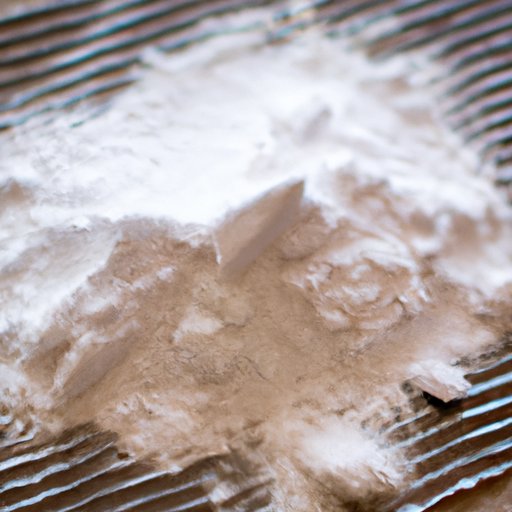Introduction
Aluminum potassium sulfate (APS) is a white crystalline compound with a chemical formula of KAl(SO4)2. It is also known as potash alum, potass alum, or potassium alum. APS has a variety of industrial uses and has been used for centuries in food preparation and medicine. This article will explore the chemical composition, production process, and environmental and health impacts of APS.

Exploring the Chemistry of Aluminum Potassium Sulfate
The chemical composition of APS consists of one atom of potassium, two atoms of sulfur, one atom of aluminum, and four atoms of oxygen. The compound has a molecular weight of 233.25 g/mol and a density of 2.62 g/cm3. It is a non-combustible solid that is insoluble in water but soluble in acids. APS is hygroscopic and can absorb moisture from the atmosphere.
The Role of Aluminum Potassium Sulfate in Industrial Applications
APS is widely used in a variety of industrial applications, including food preparation, pharmaceuticals, and agriculture. In food preparation, it is used to clarify juices, wines, and vinegars. It is also used as an ingredient in baking powder and as a preservative in pickles and other canned fruits and vegetables. In pharmaceuticals, it is used as an astringent and antiseptic, and in agriculture, it is used as a fertilizer and soil conditioner.

A Guide to Aluminum Potassium Sulfate Production
APS is produced by combining potassium hydroxide and aluminum sulfate. The raw materials are first heated to create potassium alum, which is then cooled and ground into a fine powder. The powder is then dissolved in water and filtered to remove impurities. The solution is then evaporated to form crystals, which are then dried, screened, and packaged for sale.
How Aluminum Potassium Sulfate Impacts Health and Environment
APS can be toxic if ingested in large quantities, so it is important to use caution when handling it. Ingestion of APS can cause nausea, vomiting, and abdominal pain. Prolonged exposure to APS dust can irritate the eyes, nose, and throat. APS can also be harmful to the environment if not disposed of properly. When released into the environment, APS can contaminate water sources and harm aquatic life.
Analyzing the Market for Aluminum Potassium Sulfate
The market for APS is driven by its use in a wide range of industries. The demand for APS is expected to remain strong due to its various applications. The price of APS has remained relatively stable over the past few years, though fluctuations may occur due to supply and demand.

Examining the Properties of Aluminum Potassium Sulfate
APS has a number of physical characteristics and properties that make it suitable for industrial use. It is odorless, tasteless, and has a white color. It has a melting point of 795 °C, a boiling point of 1,480 °C, and a solubility of 0.04 g/100 mL in water. APS is also reactive with many other chemicals, including alkalis and acids.
Conclusion
Aluminum potassium sulfate is a versatile compound with a variety of industrial uses. Its chemical composition, production process, and potential health and environmental impacts must all be taken into consideration when using APS. The market for APS is expected to remain strong, and its properties make it suitable for a wide range of applications. By understanding the uses and benefits of APS, companies can better utilize this compound in their production processes.

